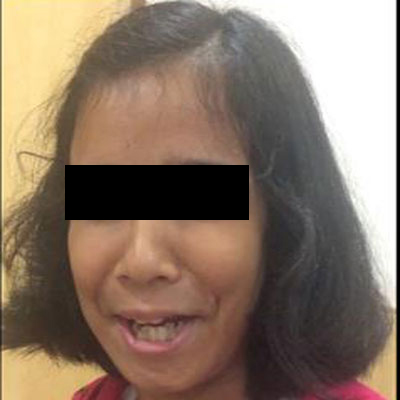An 8-year-old girl presented with history of
recurrent urinary tract infection (UTI) along with episodes of urinary
and fecal incontinence. Investigations revealed elevated creatinine (1.2
mg/dL, estimated glomerular-filtration rate (eGFR) = 42 mL/min/1.73 m
2),
bilateral hydronephrotic scarred kidneys with grade IV dilating
vesico-ureteric reflux (VUR), and thickened urinary bladder wall.
Urodynamic study confirmed a low capacity, high pressure urinary bladder
with detrussor over activity. Neurological examination and magnetic
resonance imaging of spine was un-remarkable. The diagnosis was clinched
on seeing her typical facial expression on being asked to smile (Fig.
1 and Web Video 1).
 |
|
Fig. 1 Characteristic facial
expression on asking to smile (See video at website).
|
Ochoa syndrome or Urofacial syndrome
(UFS) is characterized by urinary bladder or/and
bowel dysfunction along with a characteristic facial expression that is
most obvious during smiling or laughing wherein one gets an appearance
of a ‘grimace’ despite an attempt at smiling (resulting from abnormal
co-contraction of the corners of the mouth and eyes). It is inherited as
autosomal recessive disorder with abnormalities in either of two genes –
HPSE2 localized on chromosome 10q23-10q24 or LRIG
localized on chromosome 1p13. A heterozygous nonsense variation in exon
4 of the LRIG2 gene (chr1:113636129; C>C/G; Depth: 121x) that
results in a stop codon and premature truncation of the protein at codon
153 (p.Ser153Ter; ENST00000361127) was detected in the child by Next
Generation Sequencing.
Apart from early identification and prompt treatment
of urinary tract infection, the cornerstone of management of Ochoa
syndrome includes reducing the bladder pressure and ensuring proper
bladder drainage. Anti-cholinergics and á–adrenergic blockers along with
clean intermittent catheterization are usually the initial steps.
Bladder augmentation (augmentation cystoplasty) along with Mitrofanof
(bladder drainage conduit) is often chosen as a long-term management
plan.

